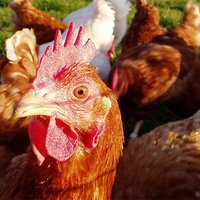HealthyHens ready with advice for organic egg producers
The results of the project HealthyHens have been summarised into recommendations within four essential areas: Prevention of intestinal worms, of feather and injurious pecking, of foot problems and keel bone deviations and, finally, optimisation of the use of outdoor areas.

In organic egg production hens should have access to outdoor areas, producers aim to achieve 100 % organic feeding, and beak trimming is not used. These factors imply a series of challenges to the producers.
HealthyHens focuses on the major bottlenecks of organic production systems in relation to hen health, which are prevention of parasite impact, feather pecking, feet and breastbone problems as well as an optimum use of outdoor areas.
Among other findings, the project demonstrated that maximising the accessibility of the outdoor range had multiple positive effects: Intestinal worms were not a major problem in flocks with free access to outdoor areas for most of the time, compared to flocks with limited access to outdoor areas. Additionally, the risks of feather damage and pecking wounds were reduced in flocks with long access times to the outdoor range.
Joint epidemiological study
Various reasons exist for parasite infection and serious health and welfare problems such as feather pecking, cannibalism and foot lesions and some of the contributing factors may be housing and management. In many individual European countries the number of organic hen flocks and the variation in husbandry conditions is too small to be able to accomplish a sufficiently significant epidemiological study to identify risk factors in relation to these health problems.
Thus, in the HealthyHens project eight countries cooperated in a joint epidemiological study with a uniform registration protocol. This means that we were able to accomplish an epidemiological study based on 110 flocks distributed in 8 countries. Each flock was visited twice: At peak of lay (when hens were 30-40 weeks old) and when hens were 60-65 weeks old. Information on housing and management were recorded during interviews with the organic egg producers as well as by means of farm registrations. Animal-based indicators were recorded by inspection of a random sample of hens. Data collection took place between February 2012 and March 2014.



Recommendations for egg producers
Many organic egg producers from most of Europe were directly involved in the project and have been directly affected by it; partly by contributing to the data collecting and partly by being informed about the results achieved. The results have been summarised in the form of recommendations in relation to the prevention of intestinal worms, optimisation of the use of outdoor areas, and the prevention of feather pecking and poultry diseases.
The recommendations are now available on the project’s website and here.
These recommendations are expected to constitute an important information source for organic egg producers in the future. The joint European data set collected during the project will be relevant for future decisions regarding the development of organic egg production.
HealthyHens is funded by CORE Organic II funding bodies. It ended 31 December 2014.
Read more
Read the entire article written by Christine Brenninkmeyer
Go to "Recommendations to ensure hen health and welfare in organic husbandry"
Articles about the project on Organic Eprints
Contact persons:
Christine Brenninkmeyer and Ute Knierim,
University of Kassel, Germany
E-mail: brenninkmeyer@wiz.uni-kassel.de and knierim@wiz.uni-kassel.de